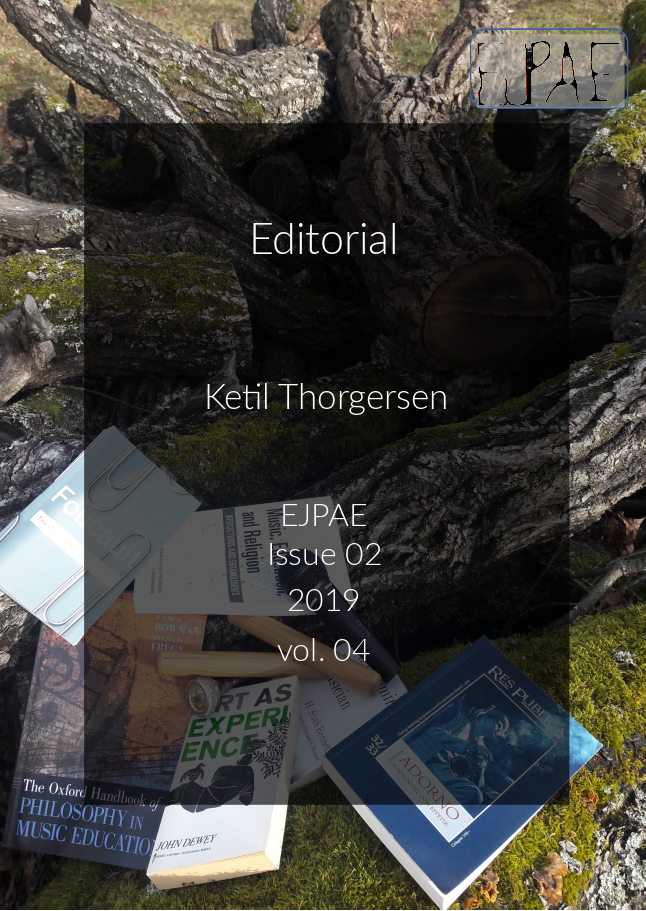Editorial - Sixth issue of the European Journal of Philosophy in Arts Education
DOI:
https://doi.org/10.5281/zenodo.3674109Abstract
The second and last EJPAE issue of 2019 is finally due – in 2020. Running a journal is interesting since there are many parameters that are out of the editor’s control – such as when reviewers return reviews, when authors return their revisions and so on. And since this journal is run voluntarily, the typesetting and finalising have to fit into my schedule at university. Sometimes this is frustrating, but everyone is gentle and patient, and when I see the great result, such and in this issue, I feel really proud!
The issue starts off with an amazing article by Juvas Marianne Liljas about a Swedish reform school, the Siljan School in Tällberg, based on the ideals of the Swedish pedagogue Ellen Key. The article is unusually empirical for EJPAE, but uses the empirical data theoretically to discuss aesthetic schooling in an early nineteen century rural setting. The eduction offered in this was an alternative to a more modernistic and mechanical education, and in the Siljan School the child’s needs were in focus and hence the arts were important ingredients in how the school was run. The article is illustrated with photography from the school which gives a strong sense of being in the milieu where the education took place.
The second article deals with the complex issues concerning the ethics involved in preforming research in a school environment. The Finnish researches Cecilia Björk and Marja-Leena Juntunen investigate what virtue ethics can offer researchers in music education and suggest solutions to ethical challenges that are relational and relative to each situation. In an approach critical of a rules and laws based practice of choosing a safe way out of possible ethical issues, they choose a completely different path. Instead of depending on predetermined solutions, researchers should make use of practical wisdom with deep respect for all involved parties and the research. The article should be read by all who do empirical research as it provides a framework to think about many different aspects of the ethics of performing research in a school environment, and how to develop the virtues necessary to become an ethical researcher.
Also on the topic of suggesting a new framework for thinking, the third and last article deals with music as a revolutionary tool in society. The Greek researcher Alexandros Kioupkiolis suggests a new paradigm for thinking about music education as a vehicle for social change. Kioupkiolis uses the concept of the commons to create a framework of collaborative action where autonomous creation and equality – both creatively and regarding ownership. To do this he goes through the history of the commons and current practices of the commons to suggest how music education can benefit from similar ideas. The presented ideas challenge current ideologies of authorship and copyright that were not designed for a public education in the first place. To delve into this article is to enter a possible world of a joyous and unpretentious education that fosters happy, creative and skilled citizens – in the arts and in general.
Ketil Thorgersen
Editor in Chief Stockholm February 18th 2020

Downloads
Published
Issue
Section
License
EJPAE provides immediate open access to all its published content. Users do not need to register or pay to read content.
https://creativecommons.org/licenses/by/4.0/
Authors of content published in European Journal of Philosophy in Arts Education (EJPAE) retain the copyright to their works. Content is free to be used by anyone as long as you "[...] give appropriate credit, provide a link to the license, and indicate if changes were made. You may do so in any reasonable manner, but not in any way that suggests the licensor endorses you or your use." and "No additional restrictions — You may not apply legal terms or technological measures that legally restrict others from doing anything the license permits." (from the Creative Commons licence agreement)
EJPAE does not charge any author or publication fees.
Authors are encouraged to deposit the final published version of their article for self-archiving (author's personal website) and/or archiving in an institutional repository immediately upon publication.




